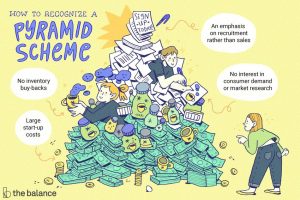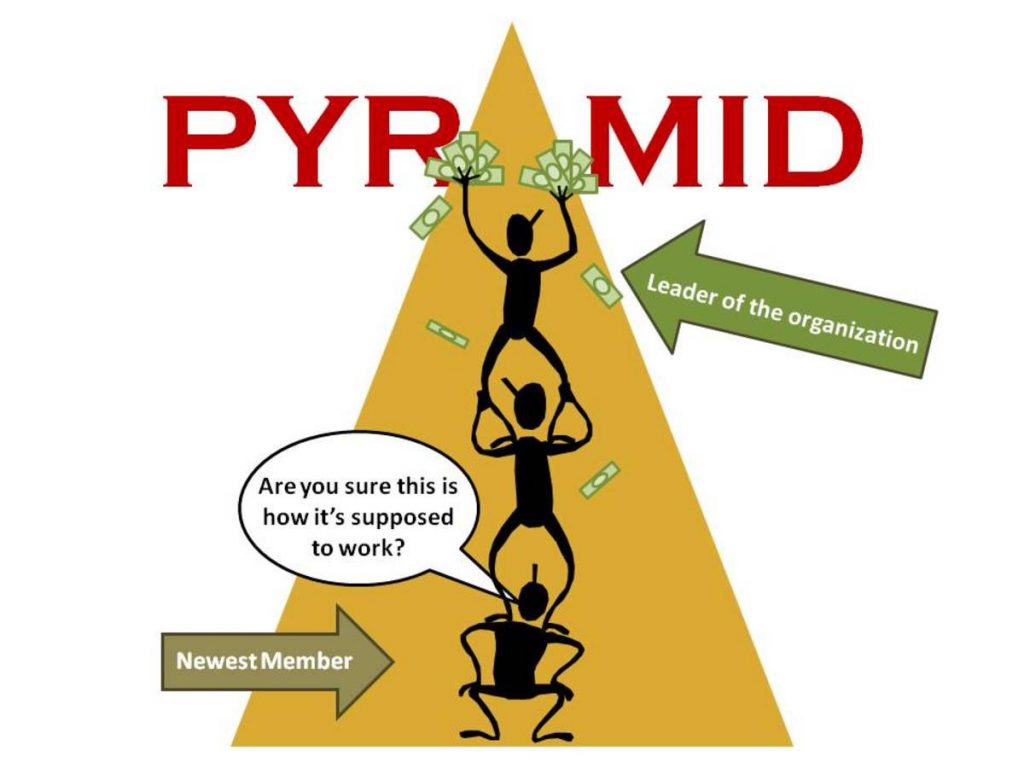
MLM vs. Pyramid Schemes
MLM vs. Pyramid Schemes

Considering a multilevel marketing opportunity (MLM)? Be careful. It may well be a legitimate multilevel marketing business. Or it may be a pyramid scheme – an illegal scam designed to steal your money.
Multilevel Marketing Can Be a Good Thing
Multilevel marketing is an attractive business proposition to many people . It offers the opportunity to become involved in a system for distributing products to consumers. Unlike the person starting a business from scratch, the multilevel marketing participant has the support of a direct selling company that supplies the products and sometimes offers training as well.
. It offers the opportunity to become involved in a system for distributing products to consumers. Unlike the person starting a business from scratch, the multilevel marketing participant has the support of a direct selling company that supplies the products and sometimes offers training as well.
Multilevel Marketing, or MLM, is a system for selling goods or services through a network of distributors. Multilevel marketing is also referred to as Network Marketing or Direct Sales.
How Does a Typical MLM Work?
The typical Multilevel Marketing program works through recruitment. You are invited to become a distributor (or contractor or consultant or associate), sometimes through another distributor of the company’s products and sometimes through a generally advertised meeting.
If you choose to become a distributor with the direct selling company, you’ll earn money both through the sales of the MLM’s products and through recruiting other distributors, by receiving a portion of the income these distributors generate.
And when those distributors recruit distributors of their own, you’ll earn money on the income they generate too.
The distributors that you sign up with your Multilevel Marketing plan and the ones they sign up in turn are called your downline. The distributor that originally recruited you and whoever is above him or her in the recruitment chain is called your upline. Often the distributor who recruits you will give you some help getting started, including training.
Interested in becoming a distributor? Read Is Direct Selling (MLM) a Good Business Opportunity?
How Big Is the MLM Market?
Big. The top 3 MLM business are:
- Avon Products, Inc., founded in 1986. Avon has annual sales of $11.3 billion and over 6.5 million sales associates. Avon markets various beauty products, jewelry, and fashion apparel.
- Amway, founded in 1959. Amway has annual sales of $10.9 billion and over 3 million sales associates selling cosmetic, wellness and food and beverage products.
- Herbalife Ltd., founded in 1980. Herbalife has annual sales of $4.8 billion and has over 2.7 million sales associates. Products include cosmetics, personal care items and nutritional supplements. In 2016 Herbalife was cleared of allegations of having a fraudulent business model after an investigation by the FBI failed to find sufficient evidence.
Listing these three is talking about just the peak of a truly gigantic iceberg. According to the Direct Selling Association, in 2015 over 20 million people in the U.S. were involved in direct selling, with total sales of $36.1 billion. More than 74 percent of the American public has purchased goods or services through direct selling. Worldwide sales are also strong with more than $154 billion in sales.
How MLM Works
As a consultant or contractor or distributor (different companies call them different things) you make your money by selling the products to other multilevel marketing participants. If they’re not already a member of your MLM company, you sign them up.
Besides earning money off your own sales, you also earn a percentage of the income generated by the distributors that you’ve brought into the program (your downline). Often there are bonuses for selling particular amounts of product or signing up a certain number of new members; you can earn cars and trips as well as cash. Sounds good, doesn’t it? And being part of a well-run MLM business can be a lot like being a member of a large extended family.
If you are considering becoming part of an MLM company, you need to investigate the opportunity thoroughly, just as you would with any other proposed business venture. Not all Multilevel Marketing plans are created equal, and some may not be MLM at all, but pyramid schemes, which are illegal.
To learn how to tell the difference between them, see Is It Multilevel Marketing or a Pyramid Scheme?
Pyramid Schemes

Unfortunately, not every multilevel marketing opportunity is a legitimate business opportunity. Many pyramid schemes, frauds designed to part the unwary from their money, are disguised.
Like multilevel marketing, pyramid schemes depend on recruiting people to become distributors of a product or service. Like MLM, the pyramid scheme offers the opportunity to make money by signing up more recruits and by accomplishing certain levels of achievement.
The big difference between multilevel marketing and pyramid schemes is that MLM is legal in Canada (and most of the US) and pyramid schemes aren’t. Participating in a pyramid scheme is an offense under the Criminal Code of Canada, punishable by up to five years imprisonment.
But it can be very difficult for the person looking for a business opportunity to tell the difference between a legitimate MLM opportunity and a pyramid scheme at a glance. How do you tell whether it’s a legitimate business opportunity or a scam?
Pyramid Schemes Have Only One Purpose

The big difference between multilevel marketing and a pyramid scheme is in the way the business operates. The entire purpose of a pyramid scheme is to get your money and then use you to recruit other suckers (ahem – distributors). The entire purpose of MLM is to move product. The theory behind MLM is that the larger the network of distributors, the more product the business will be able to sell.
Use these questions as an acid test if you’re in the least doubt as to whether the opportunity you’re considering is multi level marketing or a pyramid scheme:
Checklist for Recognizing a Pyramid Scheme
- Are you required to “invest” a large amount of money upfront to become a distributor? \This investment request may be disguised as an inventory charge. Legitimate MLM businesses do not require large start-up costs.
- If you do have to pay for inventory, will the company buy back unsold inventory? Legitimate MLM companies will offer and stick to inventory buy-backs for at least 80% of what you paid.
- Is there any mention of or attention paid to a market for the product or service? Multilevel marketing depends on establishing a market for the company’s products. If the company doesn’t seem to have any interest in consumer demand for its products, don’t sign up.
- Is there more emphasis on recruitment than on selling the product or service? Remember, the difference between multilevel marketing and a pyramid scheme is in the focus. The pyramid scheme focuses on fast profits from signing people up and getting their money. If recruitment seems to be the focus of the plan, run.
These next two questions will help you determine what the focus of the company is:
- Is the plan designed so that you make more money by recruiting new members rather than through sales that you make yourself? This is the signature of a pyramid scheme operation.
- Are you offered commissions for recruiting new members? Another pyramid scheme trademark. It’s the number of people who are willing to sign up that matters in a pyramid scheme, not the products or services being offered.
How to Protect Yourself
As always, when you’re investigating a potential business opportunity, you’ll want to gather all the information you can about the MLM company’s products and operations.
- Get (and read) written copies of the company’s sales literature, business plan and/or marketing plan.
- Talk to other people who have experience with the multilevel marketing company and the products to determine whether the products are actually being sold and if they are of high quality.
- Check with the Better Business Bureau to see if there have been any complaints about the company.
And listen carefully when you’re at that MLM recruitment meeting. Inflated claims for the amazing amounts of money you’re going to make should set your alarm bells ringing.
Being part of a successful multilevel marketing company can be both profitable and fun, but unfortunately, some purported MLM opportunities are actually just cons designed to flatten both your wallet and your dream of running a business.

